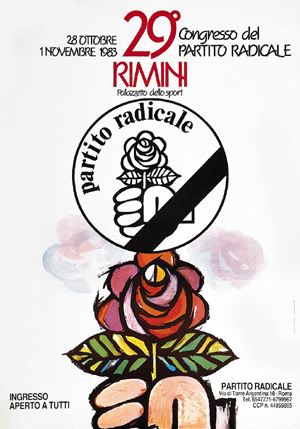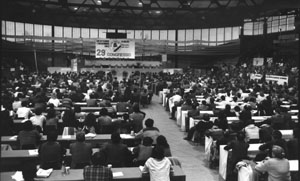|
|

The motion approved by the XXIXth Congress at Rimini concentrates primarily on the fight against death from starvation. It is the moment for insisting stubbornly, tenaciously on an objective for which in the preceding years an imposing "arsenal" of consensus and adherence, of proposals and struggles had accumulated. However, the difficulty emerges of finding an outlet for the battle for the right to life within a political context which had gravely deteriorated because of the arrogance of government by party-rule. The motion's denunciation of the illegality of the regime is always more precise and more drastic. Other issues faced in the Congressional motion are candidacy in the elections for the European Parliament, a voter's strike in city elections in Naples and Reggio Calabria, and the campaign to raise the minimum pension to 400,000 lire. The Congress elects Roberto Cicciomessere as Treasurer and Francesco Rutelli as Treasurer.
that the parties constituting the regime do not have the power nor even the possibility of creating the new rules on which to found a power system capable of controlling the process of peeling away of government policies and financing, thus setting up the conditions for an interruption of any even formal residue of legality on the part of the groups that appoint themselves to give a forced resolution to the crisis, that because the democratic institutions and tools are impracticable for any group that wants to actively oppose the illegality of the regime where that still seems feasible, the situation imposes the prevalent use of non-violent tools of struggle, the general practice of conscientious objection and the refusal of consensus for any pretence of democratic legitimacy to a system of government by party-rule; that the rigid control of written and spoken information on the part of the party-run government impedes for the most part the perception of the structural causes for the unsatisfied needs and the basic rights of individuals;that the newly organised expressions of political dissent that have emerged in Europe do not seem able to produce - aside from denouncing the threat of nuclear annihilation - any credible and non-military reply to the dangers that prejudice the security of peoples; that the Radical Party alone in Italy and Europe, by means of its political theory and practice, has worked out and presented a system of norms, a reform proposal, and a method of attacking the threats to the life and the security of humanity that can be recognised as solutions by a majority of citizens; that the possibilities of the Radical Party to pursue its objectives continually appear smaller and are probably insufficient even to give shape to active resistance to the violence and oppression of government by party-rule; considering it politically necessary, a duty, and possible to try every instrument, including those not yet utilised, with renewed vigor and in a complete way, before reaching conclusive evaluations of the fight against death by starvation; affirming that non-violent policies represent the central and distinguishing feature of the action to save millions of human lives; considering at the same time that the elections for the European Parliament impose on the Radical Party the need of keeping faith with the commitment to act positively in accord with the peremptory demands of the Nobel Prize winners appeal (to save the victims of starvation, ed.), and that is to say, to form new political alliances expressly constituted to save the greatest number of lives from the death by starvation which is taking place in the world; calling upon, as a premise for its decision, the entire history of what has been done in the last five years through Radical Party actions following the directions of the preamble to the Statute with the guidance of the ideas expressed in the Manifesto of Nobel Prize Winners, which has become a heritage of collective political conscience, of numerous and prestigious formal consenses and enforced international law; having ascertained that the economic and social destruction wreaked upon the country by the parties responsible for the degeneration into government by party-rule may in the coming months lead to a final phase of Italian history since the fall of Fascism; launches an appeal, however, to the men and women of Italy, and first and foremost to the comrades who have associated themselves with the Radical Party in 1983, that in the name of life, of peace, and of non-violence they rise up against this tendency to destroy human lives and democratic institutions by immediately joining the Radical Party in 1984 and committing themselves to the utmost in a Radical Party self-financing campaign to raise 3 billion lire, one billion of which to be found within sixty days, and organising right now a campaign for the coming months against death from starvation that has as its goal the Italian Parliament's approval of the mayors' law and that will culminate in a great march for life, peace, and disarmament in Rome at Easter of 1984; commits the Party to pursue the initiative to have the minimum pension raised to at least 400,000 lire and for a rapid approval of a pension reform bill; to denounce in every way possible the fraud perpetrated on the more than half a million voters of the PNP (National Party of Pensioners, ed.), which was denied direct representation in Parliament, by supporting, also with popular action, the request for a quick revision of the election results by the election commission. Invites the Radical Party to re-examine the Code of Parliamentary Comportment, considered an important guide for them and for the party, with the purpose of making it more incisive and evaluating its utility in fighting the party-rule system and benefiting the political objectives that the Congress had indicated. The XXIXth Congress of the Radical Party having approved the decision of those whose mandate has expired to undertake a national campaign for a voters' boycott of the municipal elections in Naples and Reggio Calabria, whose form would include party lists on the maximum level of representation, thus giving subsequent coherence, in those two municipal councils to which Radicals might be elected, to the policy lines and commitments made with the electorate and with the code of comportment of representatives in Parliament; commits the elected organs and all registered members - while appealing to them for immediate and direct mobilisation - to guarantee the utmost political initiative and active presence in the last phase of the election campaign in Naples and Reggio Calabria, so that this will be an occasion of proposals and hope - rather than just a rebellion - against the usurpation of government by party-rule and institutional illegality; decides to present Radical Party lists in the 1984 European elections; gives a mandate to all the elected organs and all registered party members to prepare a Radical Party election campaign including indications and proposals emerging from the Congressional debate; commits the elected organs and party members to promote the necessary actions for assuring the minimal levels of democratic procedure in the election, particularly in regard to the election norms and the availability of time on radio and television for informing the voters; decides to promote an internationally co-ordinated action so that, on the eve of the European Parliamentary elections, the highest organs of all the European political forces will be called to take a stand on the fight against death by starvation and on its political, legislative and institutional expressions on both the international level and in the various single countries; decides to call a national campaign to boycott payment of the RAI-TV (Italian radio and TV) subscription tax, employing the experience gained in the last two years of political and juridical battle, and gives the federal organs a mandate to put this into effect from November 1983; defines the strengthening of fiscal boycott as a valuable tool for fighting the out-law government and its mad policy of resources on military spending, and gives the federal organs a mandate to define the political and organisational methods to this end; asks the 1984 Secretary to constitute and organise the work of a commission for the revision of the Statute and to present proposals for its modification to the Congress. |
 The
XXIXth Congress of the Radical Party, seeing that the party-run regime
has usurped the the democratic constitutional system by means of the
consolidated violation, negation and subversion of the principles
that constitute the fundamental the republic;
The
XXIXth Congress of the Radical Party, seeing that the party-run regime
has usurped the the democratic constitutional system by means of the
consolidated violation, negation and subversion of the principles
that constitute the fundamental the republic;